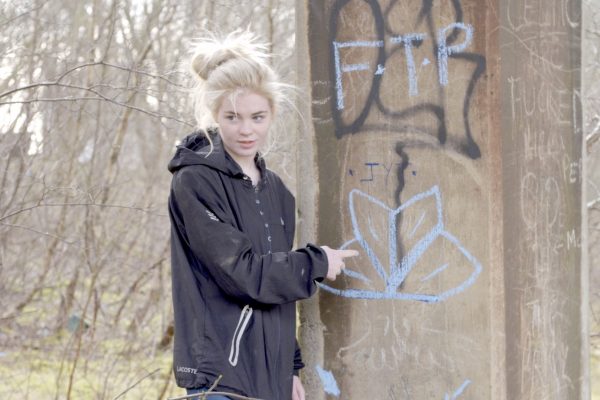As part of Edinburgh International Film Festival 2019.
“A scheme’s a non-snobby place to stay,” says Gemma, a teenage ‘scheme bird’ living in a run-down housing estate in Motherwell. This statement gets straight to the crux of Ellen Fiske and Ellinor Hallin’s documentary. Where the vast majority of a festival audience will see deprivation, squalor and advanced societal decay, Gemma sees family, community, home. Things will gradually change as she becomes a young woman, but at the outset you don’t doubt for a second that she means what she says.
Scheme Birds follows Gemma over a period of a few years as she spends her days partying, planning a future with young offender boyfriend Pat, and works out some of her bubbling aggression at a boxing club run by her grandfather. He warns her to “stay away from dafties,” advice she of course ignores. Sparky, opinionated and pugnacious, she seems to take whatever is thrown at her in her stride, until a tragic twist forces her to evaluate her life and surroundings.
Scheme Birds wouldn’t be out of place amid the filmographies of Clio Barnard or Andrea Arnold in that it finds moments of lyrical beauty in bleakness and devastation. The filmmakers return frequently to slow-motion shots of pigeons kept by Gemma’s grandfather in flight. They take off into the sky; unruly, chaotic, with some destined never to return. It’s a blunt metaphor, but such is the corresponding force in the depiction of scheme life we’ll take our poetry where we can.
The footage of Gemma and her friends is extraordinary in its candidness. They’re apparently accepting of their lot, but the fact that fights can break out at the drop of a hat suggests a deeper unhappiness and a touch-paper that only requires a spark. It may be that there is a little posturing for the cameras, but there’s something almost hypnotic about the barrage of insults spat between combatants with the staccato rat-a-tat fluidity of a veteran auctioneer.
It’s ultimately the result of this instinctive resort to violence that moves the narrative away from neo-Dickensian social portrait, and towards tragedy. It’s a moment that suddenly, and for the first time if the audience is honest, forces us to view the residents of Jerviston as people rather than subjects. It’s perhaps not a coincidence that an assault with life-altering consequences for one youngster comes after Gemma’s grandfather has exempted himself from the story. With him vanishes the means of aggression being channeled in a positive fashion.
We see the community begin to pull together. Gemma herself proves to be a deep source of empathy, warmth and comfort to those most affected. We see her grow before our eyes and it’s deeply powerful on a primal level. There are echoes of Chloé Zhao‘s The Rider in the depiction of one choices and environment suddenly biting back in the most vicious way.
It’s unlikely that the people who live in the type of places depicted in Scheme Birds will be the audience that flocks to see it. This means that there’s a disconnect that takes time for the film to overcome. It’s initially difficult for the horror at the conditions not to mutate into active disdain of Gemma and her fellow residents themselves, and their apparent indifference towards change or ‘self-improvement’. This can impart a sense of guilty voyeurism in the viewer. However, this is a deeply impressive debut, full of compassion and lacking any feeling of coercion or exploitation. These scheme birds find their instinct for freedom in their own time, and on their own terms.
UK Premiere screening at Filmhouse, Edinburgh Wed 26 Jun 2019
